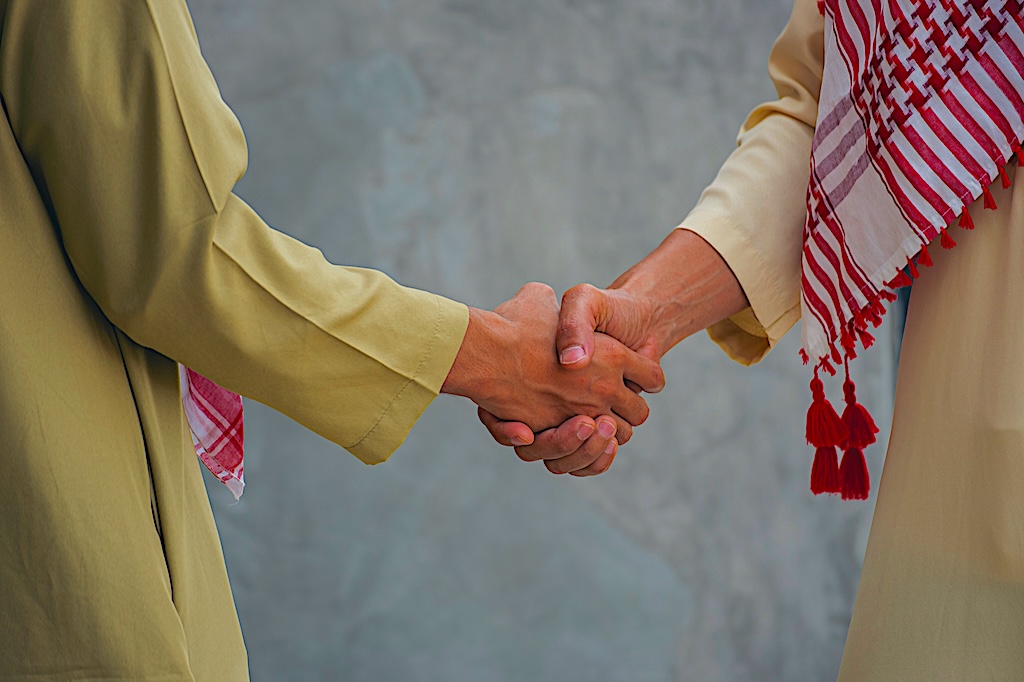When looking at greeting expressions in Arab societies, it becomes clear that they are not merely passing verbal phrases but rather a cornerstone of the social fabric. The most prominent greeting — “As-salamu alaykum” — is exchanged by everyone as the opening of any formal or informal meeting. Its meaning carries a prayer for peace and safety for the other person, and it is usually met with a detailed and highly respectful response: “Wa alaykum as-salam wa rahmatullahi wa barakatuh” (“And peace, mercy, and blessings of Allah be upon you”).
Other greetings vary according to the social context and the nature of the relationship between individuals. Expressions such as “Ya marhaban” and “Ahlan wa sahlan” are often used when welcoming guests, while phrases like “Hayyakum Allah” add a religious and spiritual dimension to the greeting. There are also more personal expressions like “Nawwartuna” (“You have brightened our place”) or “Ishtaqna lakum” (“We missed you”), which convey a deep sense of joy at meeting relatives and friends.
It is worth noting that greeting traditions in Arab culture are not limited to words but also include non-verbal gestures such as smiling, handshakes, and sometimes hugging — all of which reflect the warmth that characterizes Arab social relationships. For this reason, greetings have become an essential means of building bridges of affection and strengthening social bonds between individuals.
عِنْدَ النَّظَرِ فِي عِبَارَاتِ التَّرْحِيبِ فِي المُجْتَمَعَاتِ العَرَبِيَّةِ، يَتَّضِحُ بِشَكْلٍ جَلِيٍّ أَنَّهَا لا تَقْتَصِرُ عَلَى كَوْنِهَا تَعْبِيرَاتٍ لَفْظِيَّةً عَابِرَةً، بَلْ تُمَثِّلُ دِعَامَةً أَسَاسِيَّةً فِي النَّسِيجِ الاجْتِمَاعِيِّ. التَّحِيَّةُ الأَبْرَزُ ـ السَّلَامُ عَلَيْكُمْ ـ يَتَدَاوَلُهَا الجَمِيعُ كَبِدَايَةٍ لِأَيِّ لِقَاءٍ رَسْمِيٍّ أَوْ غَيْرِ رَسْمِيٍّ، وَتَحْمِلُ فِي مَعْنَاهَا أَبْعَادًا تَتَعَلَّقُ بِالدُّعَاءِ بِالسَّلَامِ وَالأَمْنِ لِلطَّرَفِ الآخَرِ. وَيُقَابِلُهَا عَادَةً رَدٌّ مُفَصَّلٌ يَحْمِلُ قَدْرًا كَبِيرًا مِنَ الاحْتِرَامِ: وَعَلَيْكُمُ السَّلَامُ وَرَحْمَةُ اللَّهِ وَبَرَكَاتُهُ.
وَتَتَمَيَّزُ عِبَارَاتُ التَّرْحِيبِ الأُخْرَى بِتَنَوُّعِهَا وِفْقًا لِلْمَوْقِفِ الاجْتِمَاعِيِّ وَطَبِيعَةِ العَلاقَةِ بَيْنَ الأَشْخَاصِ؛ فَكَلِمَاتٌ مِثْلُ يَا مَرْحَبًا، وَأَهْلًا وَسَهْلًا غَالِبًا مَا تَتَرَدَّدُ عِنْدَ اسْتِقْبَالِ الضُّيُوفِ، بَيْنَمَا تَأْتِي عِبَارَاتٌ كَـ حَيَّاكُمُ اللَّهُ لِتُضِيفَ بُعْدًا دِينِيًّا وَرُوحِيًّا فِي التَّرْحِيبِ. كَمَا أَنَّ هُنَاكَ عِبَارَاتٍ ذَاتَ طَابِعٍ شَخْصِيٍّ بَحْتٍ، مِثْلَ: نَوَّرْتُونَا أَوْ اشْتَقْنَا لَكُمْ، وَهِيَ تُعَبِّرُ عَنْ عُمْقِ مَشَاعِرِ الفَرَحِ بِلِقَاءِ الأَقَارِبِ وَالأَصْدِقَاءِ.
وَجَدِيرٌ بِالذِّكْرِ أَنَّ تَقَالِيدَ التَّرْحِيبِ فِي الثَّقَافَةِ العَرَبِيَّةِ لا تَقِفُ عِنْدَ حُدُودِ الكَلِمَاتِ، بَلْ تَشْمَلُ مَظَاهِرَ غَيْرَ لَفْظِيَّةٍ مِثْلَ الاِبْتِسَامَةِ، وَالمُصَافَحَةِ، وَأَحْيَانًا العِنَاقِ، وَكُلُّهَا تُجَسِّدُ طَابِعَ الدِّفْءِ الاجْتِمَاعِيِّ الَّذِي يُمَيِّزُ العَلاقَاتِ العَرَبِيَّةَ. وَلِهَذَا السَّبَبِ، أَصْبَحَتْ عِبَارَاتُ التَّرْحِيبِ وَسِيلَةً مُهِمَّةً لِبِنَاءِ جُسُورِ المَوَدَّةِ وَتَعْزِيزِ الرَّوَابِطِ الاجْتِمَاعِيَّةِ بَيْنَ الأَفْرَادِ.
https://forms.gle/h49YXoyT5Axui2Nh7 اختبر نفسك
Test yourself https://forms.gle/ipArsmEZGgN8gQXG9

